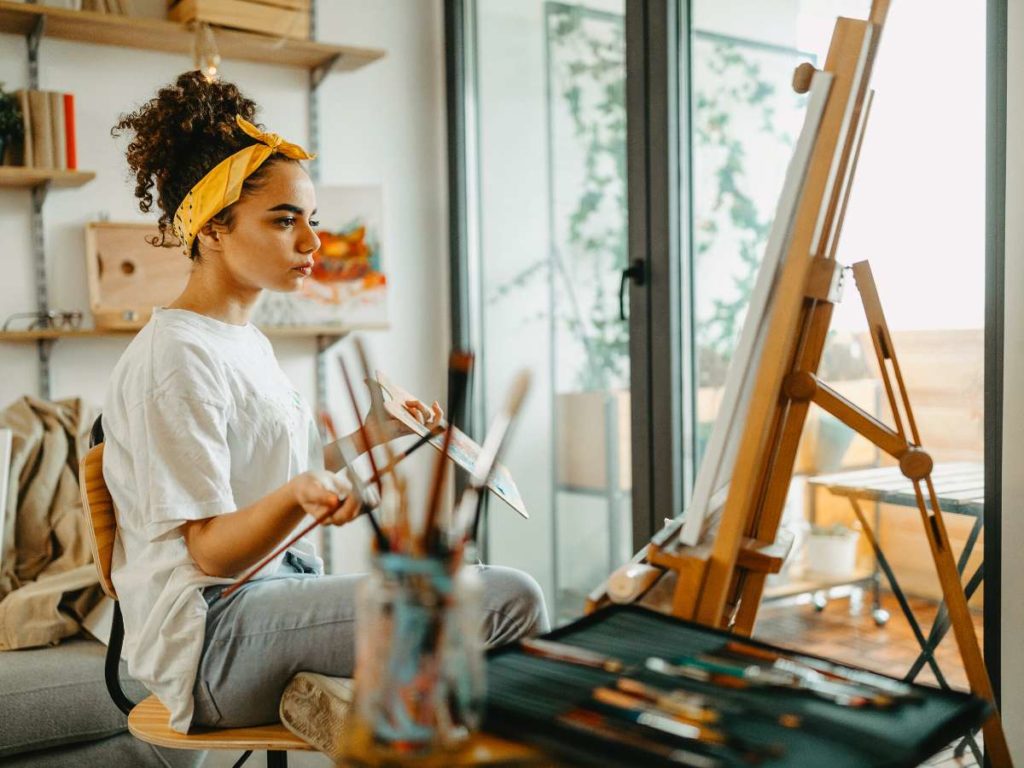
Networking skills, e.g. connecting with other artists
As a working artist, your ability to network and build relationships is essential for success. It's important to be able to reach out and communicate with other artists in the field that can help you learn from their experiences, as well as give advice on how best to progress professionally.
This also applies when seeking out potential galleries or contacts who might want to buy or showcase your work - networking opens up countless opportunities. As such, learning how best to interact online (via social media platforms) will give you an edge over those without these skills.
Additionally, attending physical art events gives you the chance of meeting people face-to-face – something which should not be undervalued either.
Business acumen, e.g. budgeting for your projects
Art isn’t just about sitting in your studio until inspiration strikes; you need to be able to manage your resources, find funding and budget effectively in order to achieve success.
This means understanding how much money is needed for each of your projects, and ensuring that it's allocated appropriately - taking into account materials costs as well as potential marketing expenses or fees associated with exhibiting work at galleries or art fairs etc.
It also involves knowing when the right time is to invest back into yourself – whether this is buying new equipment, paying for learning opportunities such as workshops/courses, or even self-promotion activities like hiring a PR agency. These decisions should all be made carefully with an eye on recouping your outlay in the long term.
Time management and organisation skills
There are few career paths that don’t involve having the ability to manage your time effectively, and it’s definitely essential in the case of creating and selling artistic works.
This means being able to plan ahead for upcoming projects or events – allowing enough time for creative ideas and the execution of works, as well as organizing all materials needed in advance.
It also involves knowing when it's best to take breaks from work - whether this is taking some down-time between projects or taking regular holidays throughout the year. You need to give yourself some time to recharge your mental batteries, and avoid the temptation to work day in, day out when you’re effectively self-employed.
Furthermore, organization skills will help you keep track of deadlines, payments owed or received, and any other important information which may be required during project delivery.
Collaboration skills, e.g. working with online galleries
Today, it's crucial for artists to be able to collaborate and work with others as part of your creative process - particularly when exhibiting works at online galleries like Singulart, or other digital platforms.
This involves being able to voice your opinion and give input on projects effectively, while also listening to other parties and taking what they have to say onboard in order to build relationships that can lead to successful collaborations.
Collaboration is interlinked with communication as a skill set, but it’s not just about hearing what’s being said, but also translating this information into action when getting down to the brass tacks of actually producing creative pieces.
It’s also worth noting that having the skills necessary for negotiating terms and conditions (e.g copyright/licensing agreements) will enable you to make informed decisions about displaying your artwork on different platforms without compromising any rights or safety concerns related to ownership of images. So as you can see, there’s much more to collaboration in this context than meets the eye.
Creativity and imagination
Arguably the most important skills you need to thrive in the professional art sphere are creativity and imagination.
Coming up with original ideas for works of art, whether this is through traditional mediums such as painting or sculpture, or something more contemporary like digital media, will become your bread and butter. And it’s wrong to assume that these skills are innate, meaning that you either have them or you don’t. In reality, most of us need to work on fostering our imaginations, and translating our ideas into tangible works.
Having a good understanding of color theory and composition will help your work stand out from the crowd. This is key to gaining traction early in your career, because there’s a lot of competition out there.
It's also beneficial to keep up-to-date on current trends in art practices, which can open doors to new opportunities that may not have been available previously.
Lastly, don't forget about self-expression – it's vital that each individual piece conveys your unique vision. If you aren’t putting something of yourself into the things you conjure up, then that special spark might be missing.
Marketing abilities, e.g. enhancing your online presence
We’ve already touched on the competitiveness of the professional art scene, and you can break through with greater ease than in the past so long as you leverage web-based promotional tools effectively.
This includes understanding how best to use various social media platforms (such as Instagram and Twitter) in order to reach out potential customers or galleries who may be interested in showcasing or purchasing your artwork.
Don’t get too focused on social media either; ensure that you have an up-to-date website with quality images of current works will help increase visibility.
Learn to build and foster your online presence early on, so that you don’t need to rely on paying anyone else to take the reins when your budget is limited. Not only does this give people an insight into what type of art you create, but also enables them to find contact information easily should they wish to get in touch about any projects or enquiries.
The bottom line
Don’t expect to find a shortcut to success as a working artist. Instead, invest in yourself and build these core skills to give yourself the best chance of flourishing sooner rather than later.


